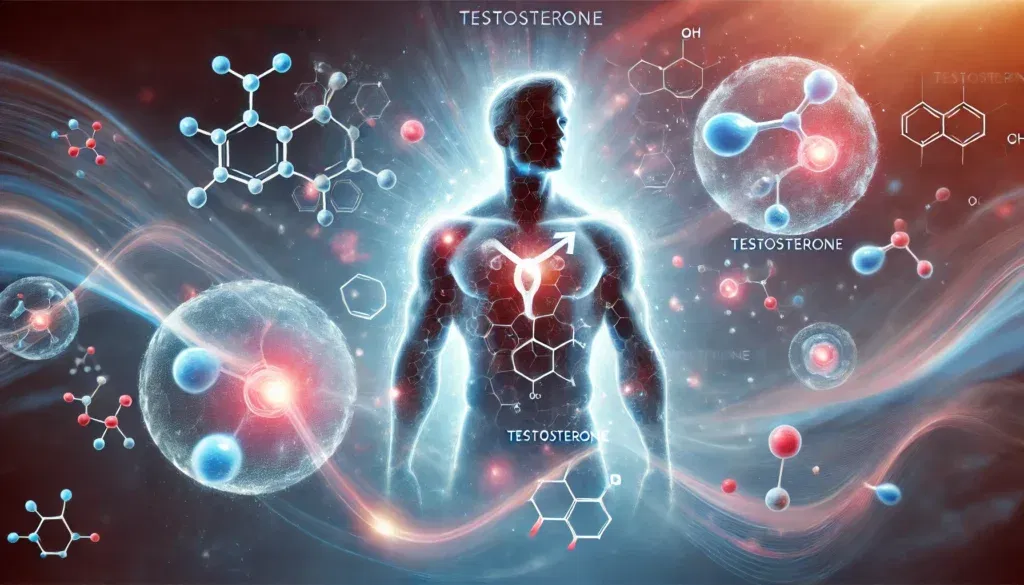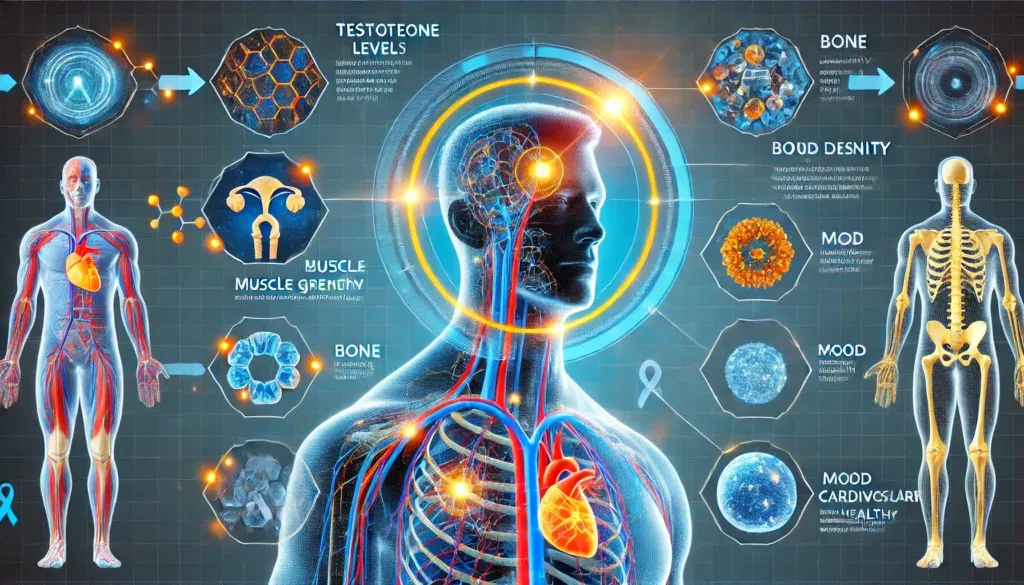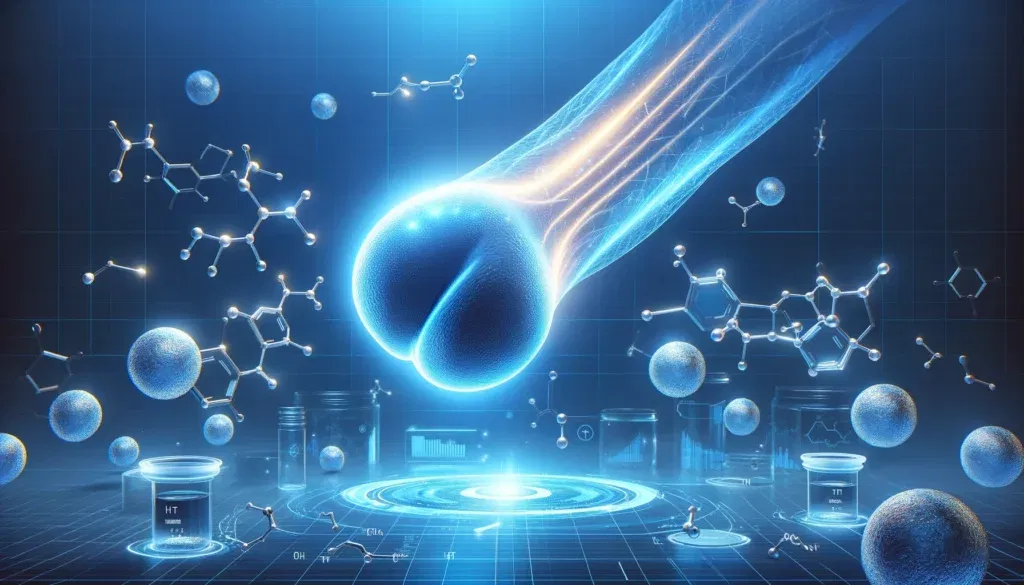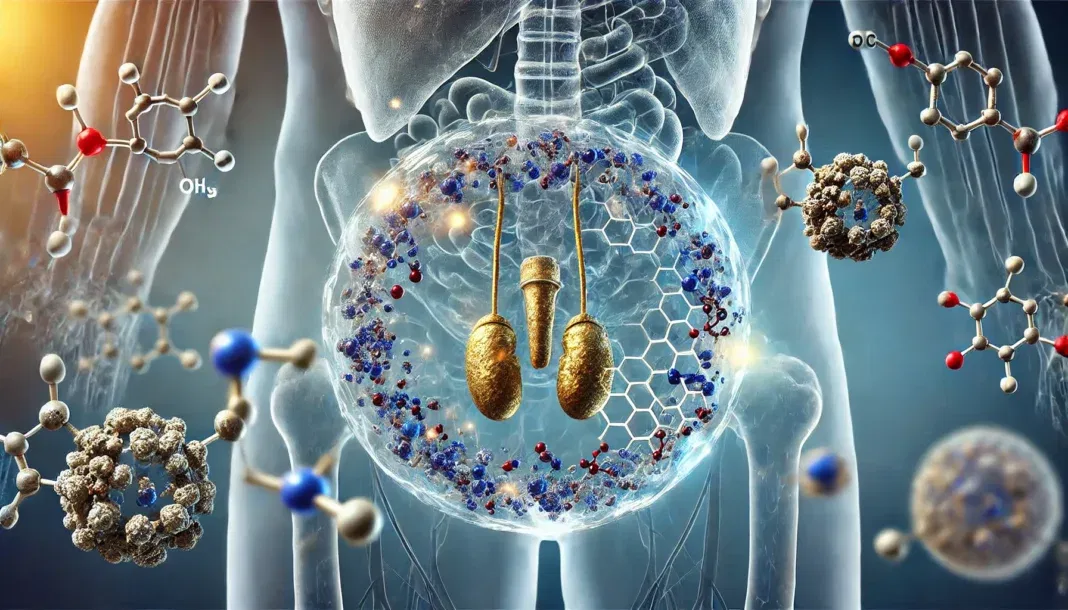Testosterone is one of the most important hormones produced by the human body, particularly in men, where it plays a central role in various physiological functions. The primary source of this hormone is the testicles, which are responsible for the production and secretion of several essential hormones that influence physical development, reproductive health, and overall well-being. Understanding the role of testicles and testosterone in men’s health is crucial for maintaining optimal bodily function and preventing various health issues related to hormonal imbalances. This article delves into the significance of testes hormones, addressing critical questions such as: Do testicles produce testosterone? What hormones do the testes produce? How do these hormones influence various aspects of health, including muscle growth, bone density, mood regulation, and longevity?
You may also like: How to Get Your Testosterone Levels Checked: Best At-Home and Lab Testing Options
The Role of Testicles in Hormone Production
The testicles, also known as testes, serve as the primary endocrine glands responsible for the production of several key hormones. These include testosterone, inhibin, and small amounts of estrogen, each contributing to different physiological processes. The testes produce hormones that regulate male characteristics, reproductive function, and overall metabolic health. Understanding how these hormones function helps in recognizing potential health concerns arising from hormonal imbalances.
Testosterone is the most well-known hormone secreted by the testicles, and it plays a fundamental role in shaping male physiology. It is responsible for the development of male reproductive tissues, including the testes and prostate, and promotes secondary sexual characteristics such as increased muscle and bone mass, deeper voice, and facial and body hair growth. The testes secrete hormones in response to signals from the brain, particularly the hypothalamus and pituitary gland, which regulate hormonal balance through a complex feedback system. This delicate balance ensures that testosterone levels remain within a healthy range, preventing issues such as low testosterone (hypogonadism) or excessive testosterone production.

Testosterone and Its Impact on Physical Health
Testosterone is crucial for maintaining overall physical health, influencing various physiological aspects such as muscle development, fat distribution, and bone density. The presence of adequate testosterone levels supports muscle protein synthesis, helping men build and maintain muscle mass. Low testosterone levels are associated with muscle loss, weakness, and increased body fat, which can contribute to metabolic disorders such as obesity and type 2 diabetes.
In addition to muscle health, testosterone plays a critical role in bone density regulation. Men with low testosterone levels are at an increased risk of osteoporosis and fractures due to reduced bone mineral density. The connection between testosterone and bone health highlights the importance of maintaining balanced hormone levels to prevent age-related deterioration of skeletal structure. Regular physical activity, strength training, and a diet rich in vitamin D and calcium can help support testosterone levels and enhance bone health.
Testosterone’s Influence on Mood and Cognitive Function
Beyond its physical effects, testosterone has a profound impact on mood and cognitive function. Research indicates that low testosterone levels are linked to increased risk of depression, anxiety, and cognitive decline. Men with hormonal imbalances may experience symptoms such as irritability, fatigue, difficulty concentrating, and a general sense of reduced well-being.
Testosterone interacts with neurotransmitters such as dopamine and serotonin, which regulate mood and emotional stability. Low testosterone levels can lead to mood disorders and affect motivation, energy levels, and cognitive sharpness. Addressing hormonal imbalances through lifestyle modifications, medical interventions, or testosterone replacement therapy can help improve mental clarity and emotional stability.
The Role of Testosterone in Sexual and Reproductive Health
One of the primary functions of testosterone is its role in sexual and reproductive health. Testosterone regulates libido, sperm production, and erectile function. The testes secrete hormones that influence the development and maturation of sperm, ensuring fertility and reproductive capabilities. Low testosterone levels can lead to decreased sexual desire, erectile dysfunction, and reduced sperm count, affecting overall reproductive health.
Factors such as stress, poor diet, lack of exercise, and aging contribute to declining testosterone levels. Addressing these factors through lifestyle changes, such as improving diet, engaging in regular physical activity, and reducing stress, can help support hormonal balance and maintain reproductive health. In cases of severe hormonal deficiencies, medical interventions such as testosterone therapy may be recommended to restore normal function.
Lifestyle Factors That Influence Testosterone Levels
Several lifestyle factors impact testosterone production and overall hormonal health. Diet plays a significant role, with nutrients such as zinc, vitamin D, and omega-3 fatty acids being essential for maintaining healthy testosterone levels. Foods rich in these nutrients, including lean meats, fish, nuts, and leafy greens, can support hormone production and balance.
Exercise, particularly resistance training and high-intensity interval training (HIIT), has been shown to boost testosterone levels naturally. Strength training stimulates muscle growth and enhances testosterone secretion, making it a crucial component of a healthy lifestyle. Additionally, adequate sleep is essential for hormone regulation, as testosterone levels peak during deep sleep cycles. Chronic sleep deprivation has been linked to lower testosterone levels and increased risk of metabolic disorders.
The Connection Between Testosterone and Longevity
Emerging research suggests a link between testosterone levels and longevity. Men with balanced testosterone levels tend to have lower risks of cardiovascular disease, diabetes, and metabolic syndrome, all of which contribute to overall health and lifespan. However, excessive testosterone levels, whether due to natural overproduction or artificial supplementation, can lead to adverse effects such as increased aggression, cardiovascular issues, and prostate enlargement.
Maintaining optimal testosterone levels through a healthy lifestyle, regular medical check-ups, and avoiding unnecessary hormone supplementation can support long-term health and well-being. Understanding the role of testicles and testosterone in men’s health provides valuable insights into maintaining hormonal balance and preventing age-related health decline.

Frequently Asked Questions (FAQ) About Testicles and Testosterone
1. How do testicles and testosterone impact overall health beyond reproduction?
Testicles and testosterone play a significant role in multiple bodily functions beyond reproduction. Testosterone influences muscle growth, fat distribution, and bone density, which are crucial for overall physical health and longevity. Additionally, it affects cognitive function, mood stability, and energy levels, making it an essential hormone for mental well-being. The hormones produced by testicles also regulate metabolism and red blood cell production, reducing the risk of anemia and improving cardiovascular health. Maintaining balanced testosterone levels is key to preventing conditions such as osteoporosis, obesity, and depression.
2. Can lifestyle changes naturally boost testosterone production in the testes?
Yes, several lifestyle changes can help optimize the way testes produce hormones, including testosterone. Regular physical activity, particularly resistance training, has been shown to stimulate testosterone secretion naturally. A diet rich in healthy fats, lean proteins, and essential micronutrients such as zinc and vitamin D can support hormone production. Reducing stress and ensuring adequate sleep are also crucial, as chronic stress and sleep deprivation can suppress the testes’ ability to secrete hormones. Avoiding excessive alcohol consumption and environmental toxins can further promote hormonal balance.
3. What are the long-term effects of low testosterone levels?
Low testosterone levels can have a wide range of long-term effects on physical and mental health. A decline in muscle mass and bone density increases the risk of fractures and osteoporosis. Additionally, low testosterone levels can contribute to weight gain, particularly increased abdominal fat, which is linked to metabolic disorders such as diabetes. Mood disturbances, fatigue, and decreased cognitive function are also associated with insufficient testosterone production. If left untreated, low testosterone can negatively impact cardiovascular health and overall longevity.
4. Do testicles produce testosterone at a consistent rate throughout life?
The rate at which testicles produce testosterone changes with age and other factors. During puberty, testosterone production surges, leading to physical and sexual development. Testosterone levels typically peak in early adulthood and gradually decline after the age of 30 at a rate of about 1% per year. However, lifestyle factors, chronic illnesses, and medications can accelerate this decline. While some decrease in testosterone is natural, maintaining a healthy lifestyle can help mitigate the effects of aging on hormone production.
5. Can stress and mental health conditions affect the way testes produce hormones?
Yes, stress and mental health conditions can significantly impact how testes secrete hormones, including testosterone. Chronic stress leads to increased cortisol levels, which can suppress testosterone production and disrupt the balance of other vital hormones. Anxiety and depression have also been linked to lower testosterone levels, potentially worsening symptoms such as fatigue, irritability, and low motivation. Managing stress through mindfulness, exercise, and therapy can help maintain hormonal equilibrium. Seeking professional medical guidance is recommended for persistent mental health concerns affecting testosterone levels.
6. What dietary changes support testosterone and hormone production in the testes?
Certain dietary changes can enhance the hormones produced by testicles, leading to better overall health. Consuming foods rich in healthy fats, such as avocados, nuts, and olive oil, can support hormone synthesis. Lean proteins, including fish and poultry, provide essential amino acids necessary for testosterone production. Micronutrients like zinc (found in shellfish and seeds) and vitamin D (from fatty fish and sunlight exposure) are crucial for healthy testes function. Avoiding processed foods, excessive sugar, and trans fats can prevent hormonal imbalances. Staying hydrated and consuming adequate fiber can further support overall hormonal health.
7. Are there environmental factors that can reduce testosterone production?
Yes, various environmental factors can interfere with how testes produce hormones, leading to lower testosterone levels. Exposure to endocrine-disrupting chemicals found in plastics, pesticides, and personal care products can negatively impact hormone production. Air pollution and heavy metal exposure have also been linked to testosterone decline. Prolonged use of certain medications, such as opioids and corticosteroids, can further suppress testosterone secretion. Reducing exposure to harmful chemicals, opting for organic foods, and using natural personal care products can help minimize environmental hormone disruptors.
8. How does sleep quality influence testosterone levels?
Sleep quality is a critical factor in regulating how testicles and testosterone function. The majority of testosterone production occurs during deep sleep, particularly in the REM stage. Sleep deprivation and disrupted sleep cycles can lead to significantly lower testosterone levels, affecting energy, mood, and physical performance. Chronic sleep issues can also contribute to weight gain and increased stress hormones, further suppressing testosterone production. Prioritizing good sleep hygiene, such as maintaining a consistent sleep schedule and reducing screen time before bed, can enhance testosterone levels naturally.
9. What are the warning signs of a hormonal imbalance caused by low testosterone?
A hormonal imbalance due to low testosterone can present in several ways, affecting both physical and mental health. Common symptoms include reduced muscle mass, increased body fat, and decreased strength. A decline in libido, erectile dysfunction, and infertility can also indicate a testosterone deficiency. Mood changes, including irritability, depression, and lack of motivation, may also be present. Fatigue, poor concentration, and memory issues can further signal an imbalance. If these symptoms persist, it is essential to seek medical evaluation and hormone testing.
10. Can testosterone therapy help restore hormone balance, and who should consider it?
Testosterone therapy can be beneficial for individuals with clinically low testosterone levels that significantly impact their quality of life. It can help restore normal hormonal function, improving muscle mass, bone density, libido, and overall energy levels. However, it is essential to undergo a thorough medical evaluation before considering testosterone therapy. Not everyone experiencing symptoms of low testosterone requires medical intervention, as lifestyle modifications may be sufficient. Additionally, testosterone therapy should be closely monitored by a healthcare professional to ensure safety and effectiveness.

Conclusion: The Vital Role of Testicles and Testosterone in Men’s Health
The impact of testicles and testosterone on men’s health is profound, influencing everything from physical strength and reproductive function to mood and cognitive performance. The testes produce hormones essential for male health, regulating vital processes that contribute to overall well-being. Understanding the importance of maintaining healthy testosterone levels through diet, exercise, and medical guidance can help men optimize their health and longevity. As research continues to uncover the intricate connections between testosterone and various aspects of health, prioritizing hormonal balance remains key to a vibrant and fulfilling life.
testosterone function in men, natural ways to boost testosterone, hormonal health and aging, impact of testosterone on mental health, testosterone and cardiovascular health, best foods for testosterone production, hormone balance and fitness, muscle mass and testosterone levels, reproductive health and hormones, testosterone therapy benefits and risks, longevity and hormonal health, men’s metabolic health, lifestyle factors affecting testosterone, endocrine system and male health, testosterone and sexual function, optimizing testosterone through exercise, stress and hormone balance, healthy aging in men, testosterone and brain function, testosterone supplements and side effects
Further Reading:
Testosterone: What it is and how it affects your health
Disclaimer: The information provided in this article is for general informational purposes only. The content does not constitute professional advice of any kind, including but not limited to medical, legal, or financial advice. HisHealthMag and its contributors make no representations or warranties regarding the accuracy, completeness, or reliability of the information presented. Always seek the advice of a qualified professional for any specific concerns or questions you may have. Neither HisHealthMag nor its authors assume any responsibility or liability for any actions taken based on the information provided in this article. The views and opinions expressed are those of the author(s) and do not necessarily reflect the official policy or position of HisHealthMag.





